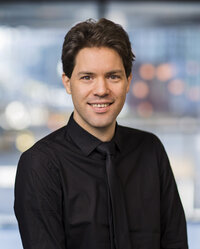From Academia to High Tech Innovation Startup and Back Again
- 14:00
- Blauwe zaal
A key goal of a modern university is forging scientific innovations into societal benefits. Start-ups play an important role in this. Recently, TU/e’s Mobile Perception Systems lab started a new company, called “AI in Motion | AIIM”, to bring its AI innovations to the market. This presentation provides a journey from research at TU/e, to testing proof-of-concepts with industry partners, and finally product development at “AI in Motion | AIIM”.
One of the innovations is AIIM’s state-of-the-art scene understanding software solution for self-driving vehicles and robots that is driven by deep learning AI. During this presentation, the ins-and-outs of this AI solution are detailed and in conjunction a live demo is provided with AIIM’s autonomous prototype vehicle.

Open ML: Democratizing and Automating Machine Learning
- 14:00
- Senaatszaal
Today, many AI learning systems are built from scratch, by hand. This takes a lot of (human) expertise, time, and resources. What if we could build AI systems that automatically acquire this expertise through clever experimentation on different tasks, and by learning from humans? What if we could learn how to learn? To facilitate this, we created OpenML, an open platform where anybody can share, discover, and reuse machine learning datasets, models and experiments. It creates a global memory of machine learning experiments, and we can train algorithms on top of it to learn what works well. Such ‘automated’ machine learning (AutoML) algorithms can help design new AI systems. This democratizes machine learning, allowing more people to use it in innovative ways. Moreover, when tasks are similar to previous ones, we can learn them with less data, enabling new applications where only little data is available.

Dr. ir. Joaquin Vanschoren
Assistant Professor
TU/e Mathematics and Computer Science - Information Systems
Bio-inspired System Design
- 14:20
- Blauwe zaal
The development of complex technical/ICT systems remains, nowadays, problematic (Boeing 737 MAX, Intel chip security flaw, governmental ICT projects). This contrasts strongly to self-learned bio-systems as animals and human beings, who demonstrate daily that things can be different. This is a motivation for working on Bio Inspired System Design / Robotics, in which self-learned animal behaviour serves as a source of inspiration. Specifically think of: motor babbling, deep learned cognitive systems, digital twin modelling for plants, edge computing for IoT systems, growth monitoring / predictive maintenance etc.


Learning task-based sampling by error backpropagation
- 14:20
- Senaatszaal
The field of deep learning is commonly concerned with optimizing predictive models using large pre-acquired datasets of densely sampled signals. In many real-world prediction problems, acquiring data is however expensive and often bandwidth constrained. This holds true across applications in healthcare, automotive, communications and beyond.
In this presentation, we demonstrate that the deep learning paradigm can be extended to incorporate an acquisition and sampling scheme that is jointly optimized under a desired minimum signal sampling rate, i.e. a ‘sampling budget’. We present Deep Probabilistic Subsampling (DPS), a widely applicable framework for task-adaptive compressive sensing that enables end-to-end optimization of a generative sampling model and a subsequent deep network that performs a required downstream system task such as signal reconstruction, classification or segmentation for example.
Through this approach, we pave the way towards the design of intelligent sensor systems that actively learn and decide how to measure, what to measure and how to provide the best possible value through optimal subsequent processing of the sensor data.

Natural Artificial Intelligence
- 14:40
- Blauwe zaal
Artificial intelligence is about constructing algorithms or agents that display "intelligent" behavior, in particular agents that are capable to make good decisions under uncertain conditions. In this talk, we will outline the computational scheme that natural agents such as brains use to make "intelligent" decisions and we will discuss our ongoing research on transferring this scheme to synthetic agents for engineering purposes. We will discuss the neuroscience, the math and physics and introduce a working nature-inspired intelligent agent that learns how to design a hearing aid algorithm through in-situ interactions between the agent and hearing aid client. (Work is based on research at BIASlab at TU/e EE department, see http://biaslab.org).

Part time professor
Department of Electrical Engineering - Signal Processing Systems
Reinforcement Learning in Logistics: Optimizing Transshipments in Dynamic Spare Parts Networks
- 14:40
- Senaatszaal
Algorithms have long been used to optimize decision making in logistics and supply chain. Traditional approaches yield excellent results when the eventual outcome of decisions can be accurately predicted, but struggle in dynamic environments where decision outcomes crucially depend on unknown future events and decisions.
Reinforcement learning (RL) has huge potential for optimizing decisions in such dynamic environments. As an example, we consider an OEM that operates a worldwide spare parts distribution network to enable quick deliveries to reduce costly downtime at customers. For expensive parts, inventory is limited, and good coverage can only be guaranteed by dynamically rebalancing inventories in response to demand variations and customer (dis)satisfaction. This is a very challenging environment for traditional approaches, but we show that RL learning yields excellent results. Moreover, we discuss which generic characteristics of parts networks make them a suitable candidate for application of RL.

Dr. Willem van Jaarsveld
Assistent professor
TU/e Industrial Engineering & Innovation Sciences - Operations Planning Accounting & Control